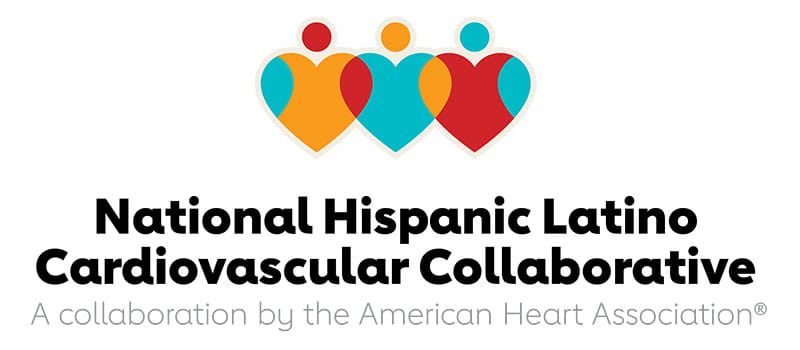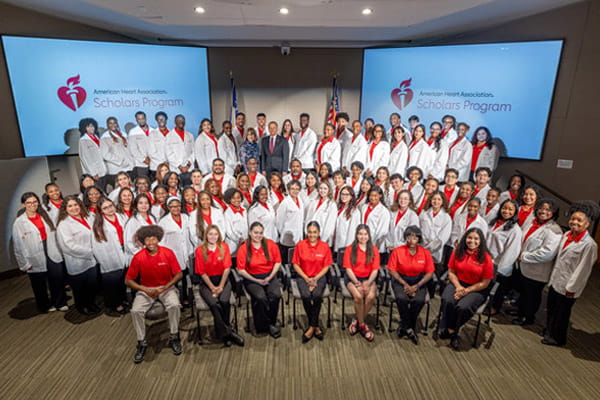
Caring for her mother, a medical student learned how a little compassion can make a difference
 American Heart Association
American Heart Association 
Learn more about our 2025 NHLCC Leadership.
The American Heart Association’s NHLCC Scholars program supports Health Profession Graduate-Level students through networking, mentorship, and professional development opportunities to grow and strengthen the future health and healthcare workforce, advancing cardiovascular health for all. The Scholar program lasts one year from November to October, after which Scholars become NHLCC Scholar Alumni.
2025 Application Cycle is closed. 2026 Application Cycle will open Summer 2026.

Caring for her mother, a medical student learned how a little compassion can make a difference




Vision
The vision of the National Hispanic Latino Cardiovascular Collaborative is to promote the treatment and prevention of cardiovascular diseases and stroke, in support of the Hispanic community, by reducing and eliminating health disparities that prevent people from living a full, optimal life.


I am pleased and excited to serve as Chair of the National Hispanic Latino Cardiovascular Collaborative (NHLCC) for the next two years. Our Collaborative is a passionate, interdisciplinary group whose members are focused on promoting the treatment and prevention of cardiovascular diseases and stroke, in support of the Hispanic community, by reducing and eliminating health disparities that prevent people from living a full, optimal life.
Carlos Rodriguez, MD, MPH, FAHA, FACC
Chair / Founding Member, National Hispanic Latino Cardiovascular Collaborative

Looking for other opportunities for students and mentors? This program benefiting undergraduate students enrolled at two- or four-year institutions is preparing the next generation of leaders in science, medicine, research and public health.

Despite improvement in CPR training, the survival rate for women experiencing cardiac arrest outside of a hospital has not improved significantly, especially for Hispanic women. The American Heart Association is determined to change that fact through a new initiative launching in August, the “Héroes Salvando Corazones/Heroes Saving Hearts” campaign. The campaign will inspire the Hispanic-Latino community to learn the two steps to Hands-Only CPR to help save lives.
The National Hispanic-Latino Cardiovascular Collaborative’s purpose is to pursue and advance Hispanic-Latino cardiovascular health and Hispanic-Latino professional development for the American Heart Association volunteers and for its members. The existing Latinx Committee (Latinx Cardiology Committee) will sunset, and current members will be asked to consider appointment to the National Hispanic-Latino Cardiovascular Collaborative.
The National Hispanic-Latino Cardiovascular Collaborative will be integrated and embedded in the American Heart Association. The Group will provide an opportunity for more Hispanic-Latino professional representation, to empower the next generation of Hispanic-Latino health professionals, provide networking opportunities for its members, mentorship opportunities through AHA’s key health equity work, and become an advisory board for AHA Hispanic-Latino-focused awareness campaigns.
The overarching goal is for the Association to consult with the National Hispanic-Latino Cardiovascular Collaborative members to help complement AHA’s work in the Health Equity space.
The Group is mostly comprised of AHA volunteers who are health and medical professionals and self-identify as Hispanic or Latino, such as, cardiologists, surgeons, primary care physicians, researchers, academics, and leaders from prominent accredited societies. The Group is also composed of volunteers who are passionate about Hispanic-Latino health and AHA’s mission.
The Group will be organizationally positioned within the AHA Office of Health Equity and supported by the AHA Somos Corazón employee resource group (ERG).
At present, approximately 19% of the United States population self-identifies as Hispanic, and that percentage is projected to increase to 29% by the year 2050[1]. As such, the health of the Hispanic population in the U.S. has received increased attention. Especially, as it relates to, the state of chronic diseases, and overall cardiovascular health among the Hispanic population. A scientific study, published in the Journal of the American Heart Association, found that approximately 48% of Hispanic adult males, 20 years and older, had prediabetes. Approximately 15% of both Hispanic males and females had a physician diagnose them with diabetes. Based on the same study, approximately 50% of Hispanic adults, 20 years of age and older, had cardiovascular diseases.
According to the Association of American Medical Colleges and the United States Office of Minority Health, there is a lack of diversity in health care practitioners today, research suggests that patients of color may experience uncomfortable interactions and communication barriers with their health care providers because of implicit and unconscious bias among physicians and other health care professionals. In fact, less than 7% of physicians are of Hispanic heritage, according to the same study. These barriers, in turn, can lower patients’ trust in the overall health care system and as a result, these patients may not complete prescribed treatments or follow-up on recommended care.
The American Heart Association believes there is an opportunity to engage the Hispanic-Latino segment of the cardiovascular community in research, education, clinical guidance, fellowship, and advocacy-related activities. One of those key pathways is to establish the National Hispanic-Latino Cardiovascular Collaborative.
[1] Projections of the Size and Composition of the U.S. Population: 2014 to 2060 (PDF) | (https://www.census.gov/)